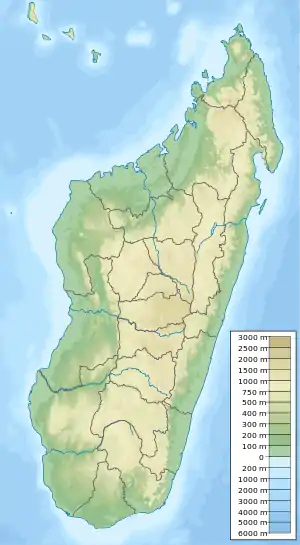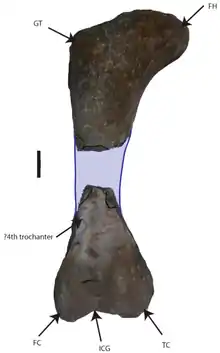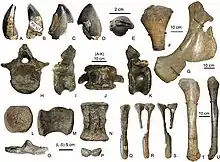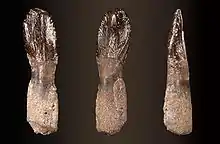Isalo III Formation
The Isalo III Formation is a geological formation in Madagascar, off the eastern coast of Africa. It dates back to the Middle Jurassic.[1] The use of the term "Isalo III" is somewhat controversial as the two prior units Isalo I and II are Triassic cross-bedded sandstone units that form a continuous depositional sequence, while the "Isalo III" sandstones are not part of the same depositional sequence, and were deposited considerably later. and are perhaps better treated as part of several separate formations.[2] It is traditionally divided into two subunits the lower, Bajocian aged Isalo IIIa unit also known as the Beronono Formation and the upper, Bathonian aged Isalo IIIb unit also known as the Sakaraha Formation or Sakahara Formation.[3] The Sakaraha Formation consists of sandstones, marls and carbonates and represents a coastal plain environment, and is laterally equivalent to the predominantly carbonate Bemaraha Formation, which represents a coastal barrier lagoon complex.[2] The formation is found in the northwest and in the southeast of the country and has provided a variety of fossils.
| Isalo III Formation Stratigraphic range: Bajocian-Bathonian ~168–165 Ma | |
|---|---|
| Type | Geological formation |
| Sub-units | Isalo IIIa or Beronono Formation Isalo IIIb or Sakaraha Formation |
| Overlies | Isalo II Formation (unconformity) |
| Lithology | |
| Primary | Sandstone |
| Other | Claystone, marl |
| Location | |
| Coordinates | 16.6°S 47.0°E |
| Approximate paleocoordinates | 23.9°S 25.1°E |
| Region | Mahajanga & Fianarantsoa Provinces |
| Country | |
| Extent | Mahajanga Basin |
 | |
Vertebrate fauna
Dinosaurs
| Dinosaurs | |||||
|---|---|---|---|---|---|
| Taxon | Species | Presence | Remains | Notes | Images |
| Lapparentosaurus[1] | L. madagascariensis | Faritany Majunga[1] | "More than [four] partial skeletons lacking skulls and teeth"[4] | Considered a titanosauriform by Mannion (2010),[5] Suggested to be a Cetiosaurid by Raveloson et al (2019)[6] |  |
| Narindasaurus | N. thevenini[7][8] | Ankinganivalaka | Right tibia, left pubis, caudal vertebrae, right fibula | Turiasaurian sauropod |  |
| Archaeodontosaurus | A. descouensi | Ambondromamy, Majunga | Teeth and mandible |  | |
| "Bothriospondylus" [1] | "B." madagascariensis | Faritany Majunga[1] | Type:"NHM R2598: mid‐dorsal vertebra." Referred: "NHM R2596–2615, R16588, R16589 dorsal, sacral and caudal vertebrae; elements of the pectoral and pelvic girdles; a partial humerus; fragments of the hindlimbs. Material represents a minimum of three individuals, based on duplication of elements and size differences."[5] | Non‐neosauropod eusauropod, distinct from Lapparentosaurus, also formerly referred to by the same name.[5] |  |
| Theropoda | Indeterminate | IIIb | MSNM V6234 "a large, serrated tooth crown"[9] MSNM V5804 vertebra, isolated teeth representing 8 morphotypes[10] | ||
| Ceratosauria | Indeterminate | IIIb | MSNM V6235 Pedal ungual[9] | ||
| ?Diplodocoidea[11] | Indeterminate | IIIb | Teeth | ||
| ?Titanosaurifomes[11] | Indeterminate | IIIb | Teeth | ||
Crocodyliformes
| Crocodyliformes | ||||
|---|---|---|---|---|
| Taxon | Species | Presence | Notes | Images |
| Razanandrongobe[3] | R. sakalavae | IIIb | Notosuchian | |
See also
- List of dinosaur-bearing rock formations
- List of fossiliferous stratigraphic units in Madagascar
- Geology of Madagascar
References
- Weishampel et al., 2004, pp.542-543
- Geiger et al., 2004
- Dal Sasso et al., 2017
- "Table 13.1," in Weishampel et al., 2004, p.266
- Mannion, Philip D. (March 2010). "A revision of the sauropod dinosaur genus ' Bothriospondylus ' with a redescription of the type material of the Middle Jurassic form ' B. madagascariensis '". Palaeontology. 53 (2): 277–296. doi:10.1111/j.1475-4983.2009.00919.x.
- Raveloson, Miky Lova Tantely; Clark, Neil D. L.; Rasoamiaramana, Armand H. (2019-11-27). "New Information on the Madagascan Middle Jurassic Sauropod Lapparentosaurus madagascariensis". Geosciences. 9 (12): 498. doi:10.3390/geosciences9120498. ISSN 2076-3263.
- Royo Torres et al., 2020
- Thevenin, 1907
- Maganuco S, Cau A, Dal Sasso C, Pasini G. 2007. Evidence of large theropods from the Middle Jurassic of the Mahajanga Basin, NW Madagascar, with implications for ceratosaurian pedal ungual evolution. Atti della Società Italiana di Scienze Naturali e del Museo Civico di Storia Naturale in Milano 148(II):261-271
- Maganuco S., Cau A. & Pasini G.. 2005 First description of theropod remains from the Middle Jurassic (Bathonian) of Madagascar. Atti Soc. it. Sci. nat. Museo civ. Stor. nat. Milano. 146, 165–202.
- Bindellini & Dal Sasso, 2019
- Ambondromahabo, M-8 at Fossilworks.org
- Dal Sasso C. & Pasini G., 2003 - First record of pterosaurs (Pterosauria, Archosauromorpha, Diapsida) in the Middle Jurassic of Madagascar. Atti della Società Italiana di Scienze Naturali e del Museo Civico di Storia Naturale in Milano, 144 (II): 281-296.
Bibliography
- Royo Torres, Rafael; Alberto Cobos, and Pedro Mocho. 2020. Origin and evolution of turiasaur dinosaurs set by means of a new ‘rosetta’ specimen from Spain. Zoological Journal of the Linnean Society Online edition. .. doi:10.1093/zoolinnean/zlaa091
- Bindellini, Gabriele, and Cristiano Dal Sasso. 2019. Sauropod teeth from the Middle Jurassic of Madagascar, and the oldest record of Titanosauriformes. Papers in Palaeontology 0. .. doi:10.1002/spp2.1282 ISSN 2056-2802
- Dal Sasso, Cristiano; Giovanni Pasini; Guillaume Fleury, and Simone Maganuco. 2017. Razanandrongobe sakalavae, a gigantic mesoeucrocodylian from the Middle Jurassic of Madagascar, is the oldest known notosuchian. PeerJ 5. e3481. doi:10.7717/peerj.3481 ISSN 2167-8359 PMC 5499610 PMID 28690926
- Geiger, Markus; David Norman Clark, and Wolfgang Mette. 2004. Reappraisal of the timing of the breakup of Gondwana based on sedimentological and seismic evidence from the Morondava Basin, Madagascar. Journal of African Earth Sciences 38. 363–381. doi:10.1016/j.jafrearsci.2004.02.003 ISSN 1464-343X
- Weishampel, David B.; Peter Dodson, and Halszka (eds.) Osmólska. 2004. The Dinosauria, 2nd edition, 1–880. Berkeley: University of California Press. Accessed 2019-02-21. ISBN 0-520-24209-2
- Thevenin, A. 1907. Paléontologie de Madagascar. IV Dinosauriens. Annales de Paléontologie 2. 121–136.
Further reading
- É. Buffetaut. 2005. A new sauropod dinosaur with prosauropod-like teeth from the Middle Jurassic of Madagascar. Bulletin de la Société Géologique de France 176(5):467-473
- S. Maganuco, C. Dal Sasso, and G. Pasini. 2006. A new large predatory archosaur from the Middle Jurassic (Bathonian) of Madagascar. Atti della Società Italiana di Scienze Naturali e del Museo Civico di Storia Naturale di Milano 147(1):19-51
- J. J. Flynn, J. M. Parrish, B. Rakotosamimanana, W. F. Simpson, and A. R. Wyss. 1999. A Middle Jurassic mammal from Madagascar. Nature 401:57-60
- A. Ogier. 1975. Etude de Nouveaux Ossements de Bothriospondylus (Sauropode) d'un Gisement du Bathonien de Madagascar [Study of New Bones of Bothriospondylus (Sauropod) from a Locality from the Bathonian of Madagascar]. Sciences Naturelles, Université de Paris VI 1-111
- M. Collignon. 1954. Decouverte de dinosauriens a Tsinjorano, district d'Ambato-Boeni [Discovery of dinosaurs at Tsinjorano, Ambato-Boeni district]. Bulletin de l'Académie Malgache 31:59-61
